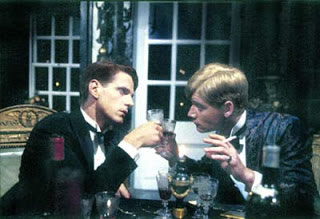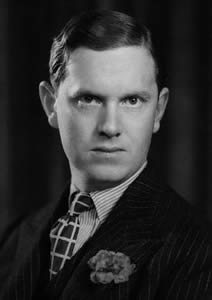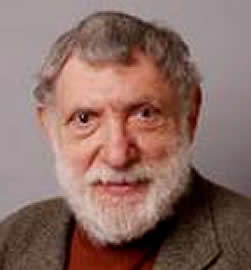De Britse schrijver Evelyn Waugh werd geboren in Londen op 28 oktober 1903. Zie ook alle tags voor Evelyn Waugh op dit blog.
Uit: Brideshead Revisited
“Finally, just as he was going, he said, “One last point. Change your rooms.” They were large, with deeply recessed windows and painted, eighteenth-century panelling; I was lucky as a freshman to get them. “I’ve seen many a man ruined through having ground-floor rooms in the front quad,” said my cousin with deep gravity. “People start dropping in. They leave their gowns here and come and collect them before hall; you start giving them sherry. Before you know where you are, you’ve opened a free bar for all the undesirables of the college.”
I do not know that I ever, consciously, followed any of this advice. I certainly never changed my rooms; there were gillyflowers growing below the windows which on summer evenings filled them with fragrance.

in de tv-serie Brideshead Revisited uit 1981
It is easy, retrospectively, to endow one’s youth with a false precocity or a false innocence; to tamper with the dates marking one’s stature on the edge of the door. I should like to think—indeed I sometimes do think—that I decorated those rooms with Morris stuffs and Arundel prints and that my shelves were filled with seventeenth-century folios and French novels of the second empire in Russia-leather and watered-silk. But this was not the truth. On my first afternoon I proudly hung a reproduction of Van Gogh’s “Sunflowers” over the fire and set up a screen, painted by Roger Fry with a Provencal landscape, which I had bought inexpensively when the Omega workshops were sold up. I displayed also a poster by McKnight Kauffer and Rhyme Sheets from the Poetry Bookshop, and, most painful to recall, a porcelain figure of Polly Peachum which stood between black tapers on the chimney-piece. My books were meagre and commonplace—Roger Fry’s Vision and Design; the Medici Press edition of A Shropshire Lad; Eminent Victorians; some volumes of Georgian Poetry; Sinister Street; and South Wind—and my earliest friends fitted well into this background; they were Collins, a Wykehamist, an embryo don, a man of solid reading and childlike humour, and a small circle of college intellectuals, who maintained a middle course of culture between the flamboyant “aesthetes” and the proletarian scholars who scrambled fiercely for facts in the lodging houses of the Iffley Road and Wellington Square. It was by this circle that I found myself adopted during my first term; they provided the kind of company I had enjoyed in the sixth form at school, for which the sixth form had prepared me; but even in the earliest days, when the whole business of living at Oxford, with rooms of my own and my own cheque book, was a source of excitement, I felt at heart that this was not all that Oxford had to offer.
At Sebastian’s approach these grey figures seemed quietly to fade into the landscape and vanish, like highland sheep in the misty heathen Collins had exposed the fallacy of modern aesthetics to me: “…

Lees verder “Evelyn Waugh, JMH Berckmans, Uwe Tellkamp”

